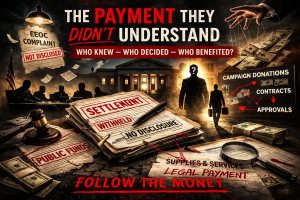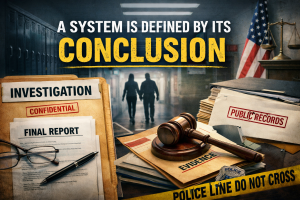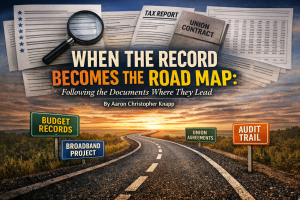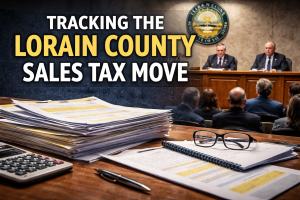When the Watchdogs Write the Rules: Conflicts of Interest on Lorain’s Charter Commission

By Aaron Knapp Investigative Journalist
Apr 29, 2025
This report is based solely on public records, legal documents, and published government opinions. All claims and quotes are sourced directly from official materials. This article is not legal advice. Additional chapters in this series are forthcoming.

Thanks for reading Aaron’s Substack! Subscribe for free to receive new posts and support my work.
A Commission in Question: Who Gets to Rewrite Lorain’s Government?
In 2020, Lorain voters approved Issue 25, creating a Charter Commission to propose a new governing structure for the city. It was a moment many believed would bring long-needed reform. But from the very start, questions arose about whether the commission was stacked with individuals who had personal stakes in the outcome.
“I am specifically concerned with conflict of interest issues,” Flores wrote.
Dennis Flores, one of the commission’s elected members, filed a formal request with the Ohio Ethics Commission on December 29, 2020. He asked whether it was lawful for current elected officials and high-ranking city employees to also serve as charter commissioners, effectively rewriting the rules that govern their own positions.
He listed seven individuals simultaneously holding city office and charter seats, including Mayor Jack Bradley, Council President Joel Arredondo, Clerk of Courts Ted Kalo, Auditor Karen Shawver, Treasurer Terri Soto, Chief of Staff Rick Soto, and Councilman Tony Dimacchia.
Each of these officials stood to potentially lose their jobs depending on how the charter was drafted. For example, Flores noted, the mayor’s office could be converted to a city manager role. The Treasurer and Auditor, both elected roles under the current system, could be eliminated or converted to appointed positions.
“Do these decisions directly affect the elected officials/current employees or their family members?… Is there a conflict of interest?”
Flores warned that this situation could invalidate the legitimacy of the entire commission.
“My understanding is any drafted charter may be declared invalid with the participation of members not eligible to serve under Ohio law.”
What followed was a months-long paper trail—requests for opinions, ignored emails, and conflicting interpretations of ethics and constitutional law. At the heart of the issue was a legal question with broad implications: Can public officials rewrite their own job descriptions while serving in dual roles?

Ethics Commission Dodges the Core Question
On January 12, 2021, the Ohio Ethics Commission responded. But instead of directly ruling on the legality of dual service, the Commission punted the issue.
“The Commission does not have the authority to determine whether the positions you have described are compatible,” wrote Karen R. King, a staff advisory attorney.
King clarified that the Ethics Commission only gives opinions on conduct proposed by the requesting party, not other individuals, and that the broader question of position compatibility fell outside their jurisdiction.
“While the Ethics Commission cannot issue an advisory opinion to you on the situation you have described, I have enclosed Commission publications that may provide general information and guidance.”
Crucially, the letter acknowledged that dual officeholding raises real concerns.
“Your question raises a fundamental issue of compatibility of public positions… whether one person can hold two public positions at the same time.”
But the Ethics Commission stopped short of declaring the current arrangement illegal, instead directing Flores to the Ohio Attorney General’s compatibility guidelines.
This bureaucratic pass-the-buck left a key ethical dilemma unresolved. Flores had sought an official answer on whether Lorain’s Charter Commission violated Ohio’s public officeholding laws. What he received was a memo deflecting responsibility and advising him to ask local officials—some of whom were implicated in the very conflict he raised.
The Attorney General’s 1971 Opinion: A Clearer Standard
Unlike the Ethics Commission, the Ohio Attorney General has issued direct guidance on the question Flores raised. In 1971, Attorney General William J. Brown issued Opinion 71-017, which remains cited today.
“A member of a city council… may not serve as a member of a municipal charter commission created under Article XVIII, Section 8 of the Constitution of Ohio.”
The opinion distinguished between general public officers and those specifically named in Revised Code 733.01—mayors, presidents of council, treasurers, auditors, safety directors. It allowed service on a charter commission for such officers only if no specific statute or constitutional clause prohibited it.
However, it explicitly ruled that dual service by council members is impermissible. That decision draws a bright line for cases like Tony Dimacchia, the sitting Councilman-at-Large who also served as a charter commissioner.
The Attorney General called these commissioners “public officers” with independent authority and constitutional significance.
“Any such provisions [that benefit current officials] are subject to scrutiny by the voters at the time of submission.”
Still, it warned of political manipulation:
“Some conflict of interest might be urged by suggesting that a charter proposal could be drafted to favor then-current officeholders.”
Despite the AG’s clear position, local enforcement never came. The issue remained buried in advisory letters and unreturned calls.
No Oversight, No Response: City Officials Go Silent
Flores didn’t stop with the Ethics Commission. On December 22, 2020, he emailed all Charter Commissioners, as well as Law Director Patrick Riley and Assistant County Prosecutor Gerald Innes. He raised urgent concerns about conflicts of interest and potential legal invalidity of any charter produced under such circumstances.
“I received no response from any of the addressees,” Flores wrote in a follow-up letter dated December 29.
In that same letter, he warned:
“The citizens of Lorain voted for the Charter Commission, and they deserve every opportunity to have a Commission that will work for their best interests.”
This silence from Lorain’s legal gatekeepers raises its own set of ethical questions. Riley, as Law Director, has an affirmative duty to evaluate and enforce Ohio law. If Flores’s warnings had merit—and public records suggest they did—then Riley had an obligation to seek a formal resolution or injunction.
Instead, the charter process moved forward without pause, giving officials under review the power to reimagine their own roles with no firewall between public duty and personal interest.
As one legal memo noted:
“Depending on the charter format decided by the commission, the following elected officials… may be affected, i.e. potentially lose their positions.”
More to Come: A Legal and Political Reckoning?
This article is only the beginning. The documents cited here are part of a growing archive of legal records, ethics opinions, administrative memos, and communications that demand broader scrutiny.
Future installments will explore why the Charter Commission vote was nearly withdrawn in September 2020, how Lorain’s water and sewer rate hikes are connected to these same officials, and whether the final charter could face legal challenge based on this history.
Already, Flores’s fears have been echoed in other Ohio municipalities. In Van Wert, for example, no sitting elected officials ran for Charter Commission in 2020, citing compatibility concerns. The Ohio Compatibility Index clearly flags clerk, mayoral, and council roles as potentially incompatible.
Whether Lorain’s voters will learn of these legal red flags before a charter is finalized remains uncertain. What is clear is that the silence from city leaders has allowed potential ethical violations to go unchecked.
Expert Legal Analysis: Dual Service and Ohio Attorney General Opinion 71-017
The establishment of the Lorain Charter Commission ignited significant debate about whether sitting elected officials could legally serve on the commission while maintaining other public offices. Dennis Flores was among the first to question the legality, and his concerns find strong support in Ohio Attorney General Opinion 71-017.
“A member of a city council… may not serve as a member of a municipal charter commission created under Article XVIII, Section 8 of the Constitution of Ohio.”
The Attorney General’s 1971 opinion holds that city council members are prohibited from dual service because of Ohio Revised Code Section 731.02. Membership on a charter commission constitutes holding a “public office,” which directly conflicts with a council member’s statutory duties. The precedent, based on State ex rel. Bricker v. Gessner, is clear and binding.
When it comes to other officers like the Mayor, Treasurer, Auditor, or President of Council, the opinion does not impose an automatic bar. Those roles are addressed under Section 733.01, which does not include a general prohibition against dual service unless a city operates under the “Federal Plan,” a determination that would require specific analysis for Lorain.
Importantly, the Attorney General acknowledged that political manipulation could occur if sitting officials drafted a charter to favor themselves. However, the opinion considered this a political, not legal, matter — leaving remedy in the hands of the voters at the ratification stage.
Thus, based on AG Opinion 71-017, Councilman Tony Dimacchia’s participation was legally prohibited. Other officials’ participation, while ethically concerning, did not constitute a per se legal violation under 1971 standards.

Modern Law and the Scorched Earth Reality: Lorain’s Charter Commission Already Crossed the Line
Although AG Opinion 71-017 provided the initial legal backdrop, Ohio’s legal framework for evaluating dual officeholding has evolved dramatically since 1971. Today, scrutiny is far tougher — and Lorain’s conduct would likely not survive.
Later Ohio Attorney General opinions, such as 79-111, 99-027, and 2010-02, adopt a rigorous compatibility test. Modern law asks whether the dual offices are subordinate, whether conflicts of interest are unavoidable, and whether statutory or ethical restrictions preclude dual service.
Applying this updated standard, serious conflicts arise. The charter commission had direct authority to change, eliminate, or preserve elected offices that its own members held. Modern interpretations emphasize that public officials must abstain from any matter where they, their family, or their employer have a definite and direct financial or personal interest.
“Public officials must abstain from any matter where they, their family, or their employer have a definite and direct interest.” — Ohio Ethics Commission, Conflicts of Interest Fact Sheet
Given that the Lorain Charter Commission could restructure or dissolve entire city offices, these standards were blatantly violated. Participation by sitting elected officials in drafting the charter created a built-in, unavoidable conflict of interest.
Additionally, Flores’s warnings about potential charter invalidation were not mere speculation. Courts in Ohio have invalidated or enjoined legislation and charter actions where improper conflicts tainted the legislative process.
By proceeding despite clear warnings, Lorain officials exposed the entire charter to future legal challenge. They scorched the earth behind them: even if voters ratify the charter, it may be vulnerable to litigation on constitutional and statutory grounds.
The people of Lorain deserved a Charter Commission that could act independently. Instead, they got one entangled in its own self-interest from day one.
Legal Disclaimer
This report is for informational purposes only and is based on publicly available records and cited legal opinions. It is not legal advice. Readers are encouraged to consult independent counsel regarding legal interpretations.
Sources Used
Ohio Ethics Commission Advisory Correspondence to Dennis Flores (January 12, 2021)
Email from Dennis Flores to Ohio Ethics Commission Executive Director Paul M. Nick (December 29, 2020)
Supplemental email and letter from Dennis Flores to Lorain Law Director Patrick Riley and Assistant Prosecutor Gerald Innes (December 22–29, 2020)
Ohio Attorney General Opinion No. 71-017 (April 8, 1971): “Compatibility of Municipal Charter Commission and Other Public Offices”
Charter Commission member list and conflict analysis prepared by Dennis Flores (2020)
Document: “Conflict of interest provision in Compatibility Index – to be decided by Ohio Ethics Commission” (internal summary, 2020)
Phillips & Co. LPA letter to Lorain County Board of Elections re: Charter Petition Withdrawal (September 29, 2020)
The Chronicle Telegram editorial: Judge Betleski fumbles Lorain’s own case of alleged voter fraud (2017)
Morning Journal coverage of Dennis Flores v. Ryan Horn, Lorain County Court challenge (2015)
Ohio Attorney General’s Compatibility of Public Offices Index
Ohio Ethics Commission, Conflicts of Interest Fact Sheet (current version)
Fact Check: Dual Office Holding and the Lorain Charter Commission
Claim: City council members are prohibited from serving on a municipal charter commission.
Verdict: True
Ohio Revised Code § 731.02 explicitly states that members of a city’s legislative authority shall not hold any other public office, with limited exceptions. Ohio Attorney General Opinion 71-017 reinforces this prohibition, concluding that city council members may not serve on a municipal charter commission, as such service constitutes holding another public office.
Claim: Other municipal officials, such as mayors, auditors, and treasurers, may serve on a charter commission unless specific prohibitions apply.
Verdict: True
While Ohio law restricts city council members from holding another public office, it does not impose a blanket prohibition on other municipal officials serving on a charter commission. However, potential conflicts of interest should be evaluated on a case-by-case basis, considering both statutory provisions and ethical guidelines.
Claim: Modern legal standards employ a more rigorous compatibility test for dual office holding.
Verdict: True
Subsequent Ohio Attorney General opinions have developed a comprehensive seven-question test to assess the compatibility of dual public positions. This test examines factors such as statutory prohibitions, subordination, and potential conflicts of interest.
Claim: The Ohio Ethics Commission mandates that public officials abstain from participating in matters where they have a definite and direct interest.
Verdict: True
The Ohio Ethics Commission’s guidance specifies that public officials are prohibited from participating in decisions that would result in a definite and direct economic benefit or detriment to themselves, their family members, or business associates.
Claim: Participation of ineligible officials on the charter commission could render its actions legally vulnerable.
Verdict: Plausible
If officials prohibited from dual service participated in drafting the charter, it could be subject to legal challenges based on the improper composition of the commission. However, the outcome of such challenges would depend on specific legal proceedings and judicial interpretations.






